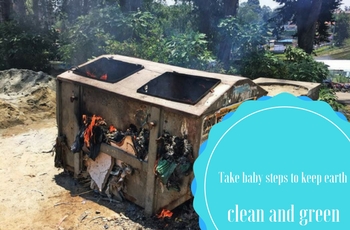22 Apr 2017, New Indian Express: ECOLOGIC- Pavitra Sriprakash, the Chief Designer and Director of Shilpa Architects writes about garbage management and the harmful effects of burning.
Read Full Article: PDF | Link to New Indian Express Site | Full Text (below)
| Take baby steps to keep earth clean and green “We collect our garbage and then BURN it!” I was shocked at this response by a resident in my neighborhood as we drove past thick fumes of smoke filling the already humid atmosphere. But this is a common practice, not just in homes, but for some municipalities which do not have the facilities for proper waste management.Let us face it, as a largely rural agrarian country, a majority of the people burn their garbage. But we now have to understand that open burning of even seemingly harmless materials like paper, cardboard and garden waste does produce a hazardous mixture of cancer-causing compounds and other toxic substances. Not to mention that nowadays our garbage is much more complex and includes foil lined plastic, several different grades of polyethylene ranging from disposable bags to bottles and of course other human and sanitary waste as well. The major toxin from these so-called backyard trash fires are dioxins which have been linked with several health effects ranging from cancers, liver problems, impairment of the immune system, the endocrine system, and reproductive functions. Chlorides are often considered the main culprits leading to the formation of dioxins due to which it has been improperly popularised that the content of polyvinyl chlorides in garbage is directly responsible for these dioxins released when garbage is burnt. In fact, even after eliminating PVC from household wastes, burning garbage with other plastics still results in release of dioxins which correlates to temperature of combustion and consequent carbon monoxide generation. Pollutants released from burning plastic waste are air borne and deposited onto land or into water bodies far and wide. A few of these pollutants such as mercury, polychlorinated biphenyls (PCBs), dioxins and furans persist for long periods in the environment and have a tendency to bio-accumulate which means they build up in predators at the top of the food web. Bioaccumulation of pollutants usually occurs indirectly through contaminated water and food rather than breathing the contaminated air directly. Humans can also be exposed indirectly just like wildlife, especially through consumption of contaminated fish, meat and dairy products. Following the 3Rs (Reduce, Reuse, Recycle) principle and disposing garbage safely will help protect your health and the environment. The first step is to reduce! Never buy anything disposable — always opt for durable products that can be recharged, repaired, or refilled. As a step towards this reduce initiative, the first habit to change is to carry a reusable bag. Though simple, this step goes a long way in reducing your garbage footprint! |



